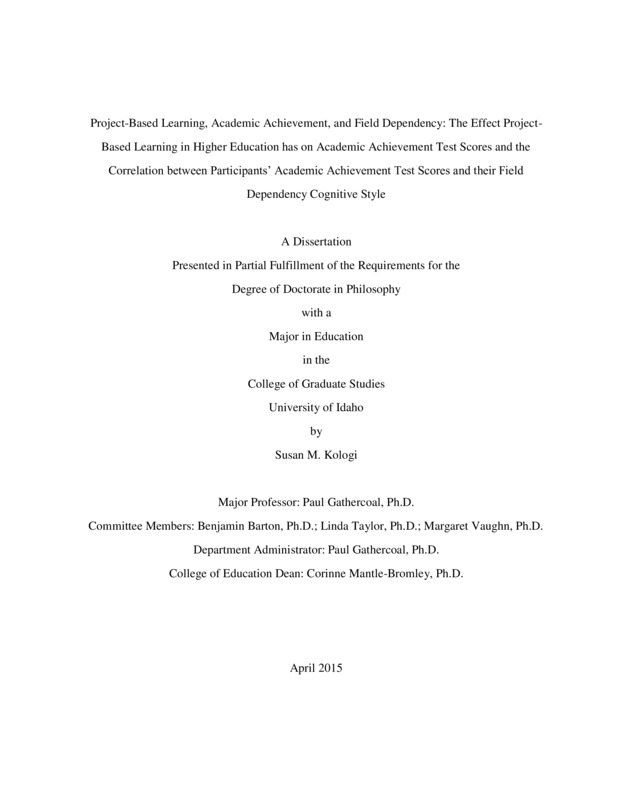Project-Based Learning, Academic Achievement, and Field Dependency: The Effect Project-Based Learning in Higher Education has on Academic Achievement Test Scores and the Correlation between Participants' Academic Achievement Test Scores and their Field Dependency Cognitive Style
Kologi, Susan. (2015). Project-Based Learning, Academic Achievement, and Field Dependency: The Effect Project-Based Learning in Higher Education has on Academic Achievement Test Scores and the Correlation between Participants' Academic Achievement Test Scores and their Field Dependency Cognitive Style. Theses and Dissertations Collection, University of Idaho Library Digital Collections. https://www.lib.uidaho.edu/digital/etd/items/kologi_idaho_0089e_10538.html
- Title:
- Project-Based Learning, Academic Achievement, and Field Dependency: The Effect Project-Based Learning in Higher Education has on Academic Achievement Test Scores and the Correlation between Participants' Academic Achievement Test Scores and their Field Dependency Cognitive Style
- Author:
- Kologi, Susan
- Date:
- 2015
- Keywords:
- Academic Achievement Cognitive Style Field Dependency Project-Based Learning
- Program:
- Curriculum & Instruction
- Subject Category:
- Higher education; Instructional design; Educational psychology
- Abstract:
-
Project-based learning (PBL) with information technology guides students to actively participate in constructing knowledge while interacting with peers and the environment. While there is some evidence of the success of PBL in higher education, most PBL research focuses on the effectiveness in K-12 classrooms. Other factors influencing a student's ability to learn in different teaching methods are cognitive styles. Field dependency is a continuum described as a person's ability or inability to rely on contextual cues, social contexts, and internal analytical skills. This study investigated the effects PBL with information technology had on two intact class groups of participants in a higher education course addressing child development, learning theories, and assessment strategies. A quasi-experimental switching replications design was utilized, where both groups participated as the control and the treatment groups for three different instructional units throughout the semester. The control group received lecture instructional style, while the treatment group participated in PBL. A pretest and posttest was administered for each of the three units. Quantitative measures included pre and post academic achievement test scores, PBL project scores, and the Group Embedded Figures Test scores. Participants responded to a reflection questionnaire by stating their perceptions and experiences with PBL and lecture instructional styles. Results suggest PBL with information technology increases academic achievement when compared to lecture instructional style (group 1 F(1,83) = 5.54, p = .02; group 2 F(1,83) = 4.17, p = .04). Participants' field dependency scores had no significant correlation with their academic achievement scores after engaging in PBL instruction (group 1 (r(51) = .24; group 2 (r(30) = .10) Indicative of the qualitative reflection questionnaire, participants stated they preferred lecture instructional style, mentioning it is easier, while they described PBL to have more of an impact on their learning and academic achievement. Introducing PBL into higher education instruction was shown to be an effective instructional style for increasing academic achievement.
- Description:
- doctoral, Ph.D., Curriculum & Instruction -- University of Idaho - College of Graduate Studies, 2015
- Major Professor:
- Gathercoal, Paul
- Committee:
- Barton, Benjamin; Taylor, Linda; Vaughn, Margaret
- Defense Date:
- 2015
- Identifier:
- Kologi_idaho_0089E_10538
- Type:
- Text
- Format Original:
- Format:
- application/pdf
- Rights:
- In Copyright - Educational Use Permitted. For more information, please contact University of Idaho Library Special Collections and Archives Department at libspec@uidaho.edu.
- Standardized Rights:
- http://rightsstatements.org/vocab/InC-EDU/1.0/

